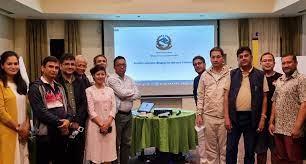
Pursuing inclusive and participatory consultations on climate actions in Nepal | UNV
Nepal’s climate is strongly influenced by its topography, which varies greatly from the high altitudes of the Himalayan mountain range in the northwest to the lowlands in the southeast. The lowland regions of Nepal have a warm and humid sub‐tropical climate. Its people are largely engaged in climate sensitive and subsistence livelihoods with low adaptive capacity, thus vulnerable to climate change.
The Paris Agreement on climate change (2015) requests each country to outline and communicate their post-2020 climate actions, known as their Nationally Determined Contributions (NDCs).Together, these climate actions determine whether the world achieves the long-term goals of the Paris Agreement and is able to reduce greenhouse gas emissions.
Nepal's goal is to achieve net zero emissions by 2045 and increase the share of clean energy to 15 per cent and forest cover to 45 per cent by 2030. As the leading UN agency responsible for helping countries to address climate vulnerabilities, UNDP supports the people and Government of Nepal in their efforts to integrate climate change and disaster risk reduction and management into the overall development process.
Rassu is part of the national political plan on climate action in Nepal, or its NDC, which pursues an inclusive and participatory process. Through the NDC, stakeholders – including experts, local people, women, indigenous people and youth – meet with line ministries in consultations at national and provincial levels to discuss climate actions. The principle of equity during participation, decision making and benefit sharing ensures equal access to women, children, youth, indigenous people, persons with disabilities, LGBTiQ and marginalized groups.
My volunteering experience has broadened my perception and knowledge in the global and national context of climate change and environment. I have also been able to build capacity to cope with the challenges of sequencing activities and coordinating deliverables between implementing partners, improve communication skills with senior government officials, and collaborate with national and international experts for sound technical knowledge exchange. --Rassu Manandhar, national UN Volunteer Specialist with UNDP, Nepal
"Being a UN Volunteer has been both a learning and sharing process for me, while informing about the provisions of the National Climate Change Policy and collecting inputs and suggestions from national, provincial and local stakeholders to inform the NDC targets," Rassu explains. "Through this, I have built a connection with wider stakeholders, ranging from government officials, development partners, academia, private sector and communities to those who have been often left behind, like marginalized women and youths."
"This platform has given me more space to advocate for the protection of the environment and promote energy efficiency and wise use of natural resources," she says.
"Switching from a petrol to electric vehicle is the environmentally-positive change I have made towards net zero emissions. We should consciously introduce routines that benefit the environment," Rassu underlines. "These include habits like shopping locally, being increasingly mindful of household waste or limiting household energy consumption and carrying reusable water bottles or shopping bags."










Add new comment